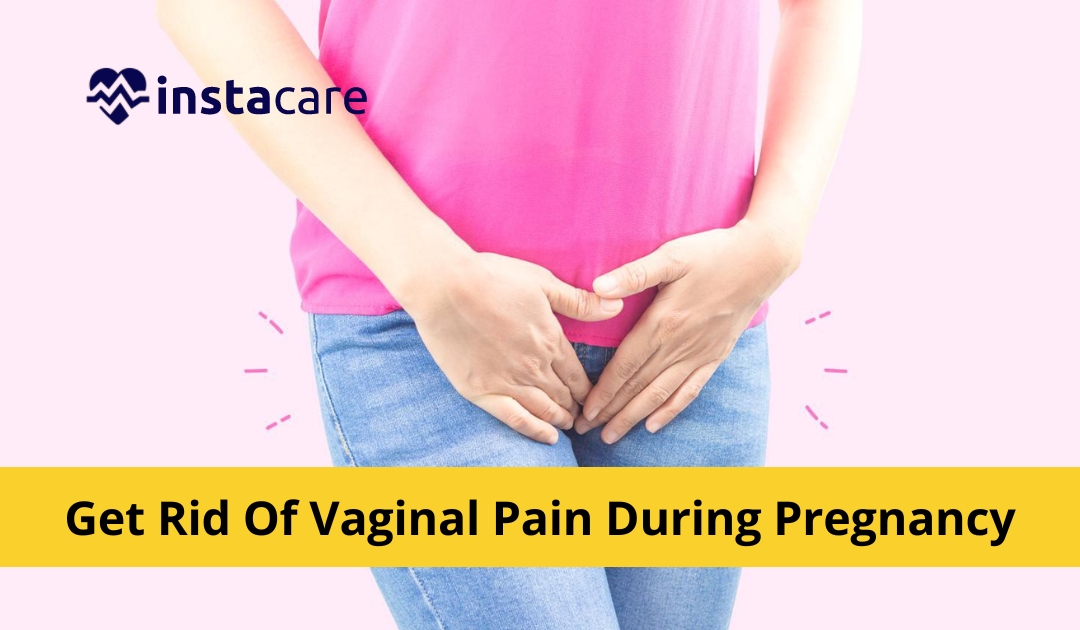Pregnancy is a beautiful and exciting time for any expecting mother, but it can also come with its share of uncomfortable symptoms. Vaginal pain is one of the most common ailments during pregnancy - from sharp cramps to constant aching in the pelvic area. For many expectant mothers, learning how to treat vaginal discomfort through preventative care and natural remedies can be life-changing during this special time. In this blog post, we’re discussing 9 proven strategies you can use to manage your vaginal pain while pregnant so that you can enjoy every moment with your growing baby!
9 common causes of vaginal pain during pregnancy
1- Early pregnancy
The miracle of life is undoubtedly a wondrous experience, but when it comes to early pregnancy, it is a period filled with excitement as well as anxiety. Expectant mothers embark on a transformative journey filled with new physiological changes, profound emotional experiences, and overwhelming anticipation of welcoming their little one into the world. Navigating through the uncharted waters of early pregnancy can be a daunting task, but this phase is crucial for the mother and the developing fetus.
As proper prenatal care, healthy habits, and informed decisions become the foundational pillars during this stage, it is vital for expectant mothers and their partners to educate themselves and maintain open communication with healthcare professionals. By embracing the challenges and joys of early pregnancy, one can take the first steps toward a healthy, nurturing environment for the soon-to-be newest member of the family.
2- Vaginal pain in second and third trimesters
Experiencing vaginal pain during the second and third trimesters of pregnancy can be both distressing and worrisome for expectant mothers. Although discomfort in the pelvic region is commonly associated with the many physical changes that occur during this period, it is essential to understand the underlying factors contributing to this symptom. Strain on the muscles and ligaments supporting the uterus, increased blood flow to the pelvic region, and the hormonal fluctuations accompanying pregnancy all contribute to varying degrees of vaginal pain.
In addition, the increased weight of the growing fetus exerts pressure on surrounding organs and nerves, leading to feelings of heaviness or aching. Although the majority of cases are harmless and typically resolve postpartum, persistent or severe pain may signal potential complications and should be brought to the attention of a healthcare professional. It is crucial for expecting mothers to monitor their symptoms closely, engage in gentle physical activity, and maintain open communication with their healthcare providers in order to ensure the health and well-being of both mother and baby.
3- Constipation
Constipation, while often dismissed as a mere inconvenience, can significantly impact one's quality of life, leading to discomfort, bloating, and even severe abdominal pain. This increasingly common ailment transpires when the muscles in your colon struggle to push fecal matter through the digestive system, resulting in hard and dry stools that can be difficult and even painful to pass. Numerous factors contribute to constipation, ranging from dietary choices and inadequate hydration to medical conditions and certain medications.
Though it may be an embarrassing subject for some, it is vital to recognize the importance of addressing constipation swiftly and efficiently, exploring a variety of potential remedies, including dietary changes, physical activity, and medical intervention if necessary. Through a proactive approach to gut health, we can combat constipation and ensure a happier, more comfortable life for those affected by this common yet often underestimated issue.
4- Increased blood flow
The fascinating process of increased blood flow is not only essential for our overall health, but it also serves as a powerful tool for enhancing our daily experiences. This incredible mechanism provides ample nourishment to our body's vital organs and tissues, allowing them to effectively perform their functions. This, in turn, enables us to engage more fully in various activities – from performing high-intensity exercises to simply enjoying an invigorating walk outdoors.
Moreover, improved circulation is linked to numerous health benefits, including reduced risk of cardiovascular diseases, improved cognitive function, and faster recovery from injuries. It is truly amazing how such a seemingly simple physiological process can greatly impact our lives, contributing to both our physical and cognitive well-being. The human body, with its intricate network of veins and arteries, serves as a perfect reminder that even the smallest of adjustments can lead to monumental changes in the way we feel, think, and perceive the world around us.
View More: How To Manage Pain After C-Section - A Comprehensive Guide
5- Bladder infections
Bladder infections, also known as urinary tract infections (utis), are an all too common and uncomfortable condition experienced by millions of people around the world. The primary culprit behind these infections is none other than the notorious bacteria, e. Coli, which is known to wreak havoc on our bodies when it enters the urinary tract. The excruciating symptoms of a bladder infection include a persistent urge to urinate, accompanied by a painful burning sensation during the process.
Furthermore, the development of a foul-smelling or cloudy urine, abdominal discomfort, and even fever can all be indicative of this debilitating ailment. Though bladder infections can affect anyone, women are unfortunately more susceptible due to their shorter urethras, which allow for a quicker access route for the bacteria. It's important to maintain good hygiene, stay well-hydrated, and avoid bladder irritants such as caffeine and alcohol, to reduce the risk of contracting a uti. Nonetheless, should the symptoms persist, it's always advisable to consult a medical professional for proper diagnosis and treatment.
6- Ectopic pregnancy
The term ectopic pregnancy might not be a familiar one to many people, yet it is an essential subject to be aware of as it can have a significant impact on the lives of women and their families. In essence, an ectopic pregnancy occurs when a fertilized egg implants itself in a place other than the uterus, typically the fallopian tube, and starts to develop there. This unconventional situation is not only a challenging experience emotionally for those affected but can also trigger alarming health risks for the mother, the most notable of which is the threat of tubal rupture and internal bleeding that could lead to a life-threatening emergency.
As awareness about ectopic pregnancies increases, it becomes crucial for medical professionals and would-be parents to have a better understanding of the possible causes and symptoms. Early detection and proper intervention are paramount to ensure the well-being of women and their ability to conceive in the future. Encouraging open discussions on this topic leads to the reassurance that help and support are available for those faced with this difficult journey.
7- Bacterial vaginosis or a yeast infection
A question that often baffles women experiencing uncomfortable symptoms down there is - am i dealing with bacterial vaginosis or a yeast infection? Although both infections display similar red flags like itching, burning, and discomfort, it's crucial to correctly identify the culprit to seek the most effective treatment. Bacterial vaginosis, commonly known as bv, is a bacterial imbalance, whereas a yeast infection stems from an overgrowth of the candida fungus.
Deciphering the cause of your symptoms might feel overwhelming, but the distinctive markers such as the malodorous, thin grey discharge characteristic of bv, and thick, white discharge associated with a yeast infection can help you pave the way towards the right diagnosis. Consulting a healthcare professional is always advisable to confirm your suspicions and receive the appropriate course of action. So, let's empower ourselves with knowledge and not shy away from discussing these common, yet often stigmatized, women's health issues.
8- Symphysis pubis dysfunction
Symphysis pubis dysfunction (spd) is a condition that affects many individuals, predominantly pregnant women, causing immense discomfort and limiting daily activities. Often mistaken for common pregnancy-related aches, spd is an ailment that arises due to the excessive relaxation of the symphysis pubis joint, the connection between the two halves of the pelvis. The hormone relaxin, vital for preparing the body for childbirth, contributes to this phenomenon by loosening the ligaments that maintain the joint's stability.
As the joint becomes unstable, an array of painful symptoms arises, such as sharp pains in the groin or lower back, a clicking sound while walking, and difficulty in movement. It is essential for those experiencing spd to consult medical professionals, who can recommend tailored treatment plans, including physical therapy, pain medication, and support belts. By addressing spd in a timely manner, those affected can experience relief from pain and reclaim their independence in everyday life.
9- STD
Sexually transmitted diseases (stds) are a prevalent health concern that deserves attention and open conversation. Often, stigma and misconceptions surround the subject, leading individuals to feel ashamed or uncomfortable discussing their experiences with stds. Initiating a dialogue about these infections can help create a supportive environment that fosters awareness, prevention, and proper treatment strategies.
Demystifying the topic is essential as stds can affect anyone, regardless of age, gender or sexual orientation. Being informed and responsible about one's sexual health not only protects oneself but also helps prevent the spread of stds among others. By embracing a culture of compassion and understanding, we can collectively work towards overcoming the challenges posed by these infections and ensure a healthier society.
How to get rid of vaginal pain during pregnancy
1- Maintain proper hygiene
Maintaining proper hygiene is not just essential for our physical health, but also significantly impacts our mental well-being and social interactions. By adopting healthy practices such as regular handwashing, oral care, and personal grooming, we contribute to a thriving, disease-free environment for ourselves and those around us. A diligent hygiene routine also reduces the risk of infections, keeps us feeling invigorated, and elevates our self-esteem, ensuring that we project a positive image in both our personal and professional lives.
Moreover, fostering good habits of cleanliness resonates with those around us and instills a sense of responsibility for the overall welfare of the community. In conclusion, investing time and effort in maintaining proper hygiene not only preserves our health but also enriches our lives and relationships with others.
2- Maternity support belt
The maternity support belt is a lifesaver for many expecting mothers as they navigate through the wonders of pregnancy. This ingenious product is designed to provide much-needed relief by alleviating pressure and distributing the weight of your growing baby bump evenly. The belt gently wraps around your lower back and under your belly, forming a cradle of support that eases discomfort while standing or walking.
The best part is, these belts are fully adjustable, allowing you to achieve the perfect fit throughout your pregnancy journey. Many women rave about the improvement in their posture, reduced lower back pain, and even better sleep quality they experience thanks to the maternity support belt. Don't let pregnancy discomfort hold you back; try a maternity support belt and take a step towards a more comfortable and enjoyable pregnancy journey.
3- Wear loose-fitting, breathable clothing
There is no denying that comfort plays a crucial role in our daily routines and activities, especially when it comes to our attire. Hence, wearing loose-fitting, breathable clothing can be a game-changer in providing ease as well as boosting confidence throughout the day. Not only do such clothes promote better air circulation, assisting in regulating body temperature, but also they help prevent irritations and skin rashes due to excessive sweating or tight materials.
By choosing fabrics like cotton, linen, or moisture-wicking materials, one can ensure that comfort is not compromised regardless of the weather conditions, be it scorching summer days or humid monsoon evenings. Furthermore, embracing loose, breathable attire grants a sense of freedom, allowing unrestricted movement and encouraging a healthier, more enjoyable lifestyle. Ultimately, such clothing choices encapsulate a perfect blend of fashion and practicality while elevating one's sense of well-being.
4- Avoid sitting for prolonged periods of time
It's no secret that our modern sedentary lifestyles can have a significant impact on our physical and mental well-being. And although many of us may find ourselves confined to a desk for hours on end due to work or leisure, it's essential to break the chains of continuous sitting and get up to move and stretch our legs frequently. By avoiding extended periods of immobility, we not only improve our posture and circulation, but we can also reduce our risk for a myriad of health issues such as obesity, diabetes, and heart disease.
Additionally, incorporating brief walks, light exercise, or even engaging in an impromptu dance session can boost our mood, creativity, and productivity. So remember, always be mindful of the time spent rooted in your chair and strive to infuse your day with bouts of activity – for the sake of your body, heart, and mind.
5- Cleaning the area regularly with warm water and mild soap
Keeping your living and working spaces clean and hygienic is an essential part of maintaining overall health and wellbeing. One of the most effective ways to achieve this is by regularly cleaning surfaces and high-touch objects with warm water and a mild soap. The use of warm water not only helps to dissolve dirt and grime more effectively, but it also has a soothing effect, making cleaning a more enjoyable and therapeutic experience.
Mild soap, on the other hand, is gentle on your skin and on the surfaces you clean, ensuring that you maintain the beauty and longevity of your belongings. By establishing a regular cleaning routine using warm water and mild soap, you can create a serene and sanitary environment that fosters both physical and mental health, ultimately enhancing the quality of your daily life.
View More: Pregnancy Anxiety - 11 Natural Remedies For Anxiety During Pregnancy
6- Take breaks to stretch every couple of hours
Taking a break from your tasks to stretch every couple of hours might seem like a trivial thing to do, but it actually brings numerous benefits to both your mental and physical wellbeing. Incorporating these small pauses into your routine can help you feel revitalized, improving your focus and productivity levels.
In fact, stretching has been shown to not only alleviate muscle tension and stiffness but also to enhance blood circulation, ensuring that our brain receives an optimal amount of oxygen and nutrients. It also provides a great opportunity for you to momentarily detach from the stresses of daily life, allowing your mind to reset and approach challenges with a fresh perspective. So, don't underestimate the power of periodic breaks to stretch your body; they may just be the perfect tonic to supercharge your day.
7- Practice relaxation techniques to reduce stress levels
In today's fast-paced world, stress has become an unwelcome companion for many of us. However, a simple yet effective way to combat this modern malady is by practicing relaxation techniques. Several methods, such as deep breathing exercises, progressive muscle relaxation, and mindfulness meditation, can significantly reduce stress levels and promote overall well-being.
These techniques work by activating the body's innate relaxation response, resulting in a state of tranquility and mental clarity. Moreover, they have been scientifically proven to lower blood pressure, improve sleep quality, and even boost the immune system. By incorporating relaxation techniques into our daily routines, we are not only investing in our mental health but also fostering a more balanced, joyful lifestyle. So, let's hit the pause button on our hectic lives and breathe in the calming power of relaxation.
8- Prenatal massage
Prenatal massage is an incredible way for expectant mothers to relieve tension, nurture their bodies, and connect with their growing baby. This specialized form of massage therapy is not only designed to alleviate common pregnancy-related discomforts, such as lower back pain, tight joints, and swelling, but also promotes overall wellness and relaxation. Under the skilled hands of a certified prenatal massage therapist, one can experience a holistic approach to pregnancy self-care.
In addition, the soothing touch can create emotional benefits, such as reducing anxiety and stress levels, which in turn encourage a harmonious environment for both mother and child. As a mom-to-be, it's essential to nourish your wellbeing, making prenatal massage a priceless way to enhance your journey towards motherhood.
9- Reach out to your doctor if the pain persists
Experiencing persistent pain can be highly distressing and may impact your quality of life significantly. In such situations, it is vital to reach out to your healthcare professional for guidance and support. Your doctor can help by suggesting various assessment tools to identify the cause of the pain and recommend appropriate treatments to alleviate it.
Furthermore, your healthcare provider can equip you with strategies that empower you to manage your pain effectively – both physically and emotionally. Remember, you do not have to endure the pain alone; a quick consultation can put you on the path to recovery, and help you regain control over your life.
Conclusion
While vaginal pain during pregnancy can be uncomfortable, there are many things expectant mothers can do to help relieve the discomfort. Exercise and relaxation techniques such as yoga, meditation, and deep breathing can help relax your pelvic muscles. Physical therapy for gentle, hands-on treatments also may be beneficial in managing your pain. Otc medications such as ibuprofen or tylenol may also provide some relief from discomfort.
Eating a healthy and balanced diet full of vitamins and minerals is important to support your body throughout your pregnancy journey. Lastly, maintaining communication with your doctor regarding any discomfort you feel will ensure that you are doing all that you can to reduce the pain in which you experience. Remember, don’t hesitate to reach out for assistance if needed as taking care of yourself is the best way to take care of your baby!
Please book an appointment with the best Gynecologist in Lahore, Karachi, Islamabad, and all major cities of Pakistan through InstaCare, or call our helpline at 02137136090 to find the verified doctor for your disease.
Source: https://instacare.pk/blog/how-to-get-rid-of-vaginal-pain-during-pregnancy











